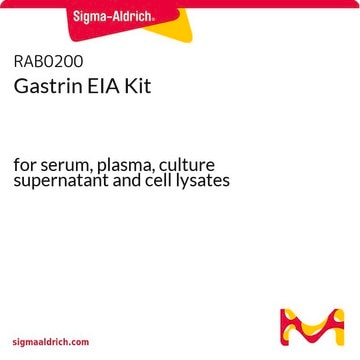G9020
Gastrin I human
≥95% (HPLC), powder
Synonym(s):
Gastrin I, heptadecapeptide, HG-17, Little gastrin I, human, [18-Pyroglutamic acid]big gastrin I-(18-34)-peptide amide, human, [pGlu18]-Big gastrin I fragment 18-34 amide
About This Item
Recommended Products
biological source
human
Quality Level
Assay
≥95% (HPLC)
form
powder
mol wt
2098.20
storage condition
(Keep container tightly closed in a dry and well-ventilated place)
concentration
≤100%
technique(s)
protein expression: suitable
solubility
water: 1.00-1.04 mg/mL, clear, colorless
UniProt accession no.
storage temp.
−20°C
SMILES string
CSCC[C@H](NC(=O)[C@H](Cc1c[nH]c2ccccc12)NC(=O)CNC(=O)[C@H](Cc3ccc(O)cc3)NC(=O)[C@H](C)NC(=O)[C@H](CCC(O)=O)NC(=O)[C@H](CCC(O)=O)NC(=O)[C@H](CCC(O)=O)NC(=O)[C@H](CCC(O)=O)NC(=O)[C@H](CCC(O)=O)NC(=O)[C@H](CC(C)C)NC(=O)[C@H](Cc4c[nH]c5ccccc45)NC(=O)[C@@H]6CCCN6C(=O)CNC(=O)[C@@H]7CCC(=O)N7)C(=O)N[C@@H](CC(O)=O)C(=O)N[C@@H](Cc8ccccc8)C(N)=O
InChI
1S/C97H124N20O31S/c1-49(2)39-68(114-95(146)71(43-54-46-100-59-18-11-9-16-57(54)59)116-97(148)73-19-12-37-117(73)76(121)48-102-85(136)60-24-30-74(119)104-60)93(144)110-65(29-35-81(130)131)91(142)109-64(28-34-80(128)129)90(141)108-63(27-33-79(126)127)89(140)107-62(26-32-78(124)125)88(139)106-61(25-31-77(122)123)87(138)103-50(3)84(135)113-69(41-52-20-22-55(118)23-21-52)86(137)101-47-75(120)105-70(42-53-45-99-58-17-10-8-15-56(53)58)94(145)111-66(36-38-149-4)92(143)115-72(44-82(132)133)96(147)112-67(83(98)134)40-51-13-6-5-7-14-51/h5-11,13-18,20-23,45-46,49-50,60-73,99-100,118H,12,19,24-44,47-48H2,1-4H3,(H2,98,134)(H,101,137)(H,102,136)(H,103,138)(H,104,119)(H,105,120)(H,106,139)(H,107,140)(H,108,141)(H,109,142)(H,110,144)(H,111,145)(H,112,147)(H,113,135)(H,114,146)(H,115,143)(H,116,148)(H,122,123)(H,124,125)(H,126,127)(H,128,129)(H,130,131)(H,132,133)/t50-,60-,61-,62-,63-,64-,65-,66-,67-,68-,69-,70-,71-,72-,73-/m0/s1
InChI key
GKDWRERMBNGKCZ-RNXBIMIWSA-N
Gene Information
human ... GAST(2520)
Looking for similar products? Visit Product Comparison Guide
Amino Acid Sequence
General description
The GAST gene is mapped to human chromosome 17q21. Gastrin is a linear peptide. It is a gastrointestinal hormone, produced by G cells in the stomach.
Application
- to treat AGS stably transfected with gastrin receptor/cholecystokinin receptor 2 (CCK2R) (AGS-GR) cells to study the expression and secretion of clusterin (CLU) in human gastric cancer cells
- as a component of growth medium for culturing mouse normal esophageal epithelial organoid (mNEEO)
- as a supplement in basal culture media to use for organoid-like cultures
- as a molecular weight marker to calibrate superdex® 30 columns.
Biochem/physiol Actions
Other Notes
Legal Information
antibody
related product
Storage Class Code
11 - Combustible Solids
WGK
WGK 3
Flash Point(F)
Not applicable
Flash Point(C)
Not applicable
Personal Protective Equipment
Certificates of Analysis (COA)
Search for Certificates of Analysis (COA) by entering the products Lot/Batch Number. Lot and Batch Numbers can be found on a product’s label following the words ‘Lot’ or ‘Batch’.
Already Own This Product?
Find documentation for the products that you have recently purchased in the Document Library.
Customers Also Viewed
Articles
Organoid culture products to generate tissue and stem cell derived 3D brain, intestinal, gut, lung and cancer tumor organoid models.
Organoid culture products to generate tissue and stem cell derived 3D brain, intestinal, gut, lung and cancer tumor organoid models.
Organoid culture products to generate tissue and stem cell derived 3D brain, intestinal, gut, lung and cancer tumor organoid models.
Organoid culture products to generate tissue and stem cell derived 3D brain, intestinal, gut, lung and cancer tumor organoid models.
Our team of scientists has experience in all areas of research including Life Science, Material Science, Chemical Synthesis, Chromatography, Analytical and many others.
Contact Technical Service![[Leu15]-Gastrin I human ≥95% (HPLC)](/deepweb/assets/sigmaaldrich/product/structures/153/342/d4cb3dd7-13f1-46cf-8d1f-3907a5de7a83/640/d4cb3dd7-13f1-46cf-8d1f-3907a5de7a83.png)










